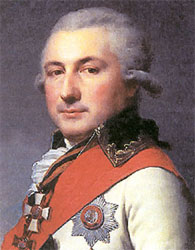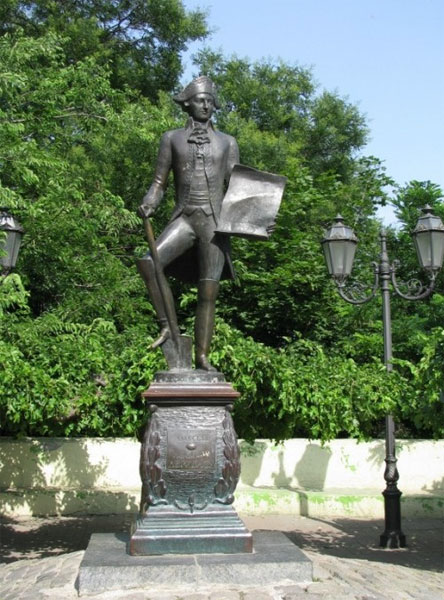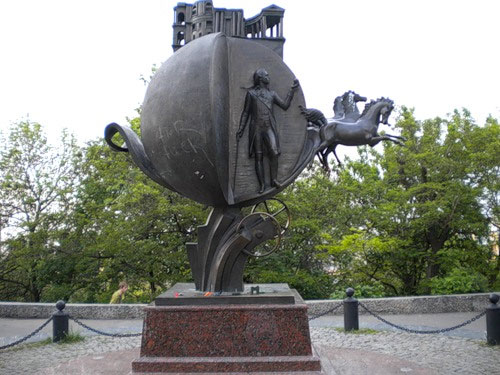
The Bribe of De Ribas
/ Главная / Russkiy Mir Foundation / Publications / The Bribe of De RibasThe Bribe of De Ribas

Jose Pascual Domingo de Ribas was born on June 6, 1749, in Naples. In Russia he is better known as Osip Mikhailovich Deribas. And as with others who lived in the wild and romantic 18th century, his biography is full of mysteries and all sorts of dark spots, which it seems that he himself did much ensure. His actual year of birth is not really known, as there are several versions. The same fog clouds his day of birth. Many historians point to September 24, but to the Russian mind it seems more appropriate for such an extraordinary person to share the same day as Alexander Pushkin. And there is a connection here: Pushkin’s Ethopian grandfather Ibragim Hannibal commanded the very same fire ship in which the then unknown de Ribas began his military career.

The situation surrounding his employment in the service of the Russian army remains unclear. Of great help was Alexei Orlov-Chesmensky. And there was talk in the royal court that clever Spaniard provided assistance in the abduction in Italy of “Countess Tarakanova”, pretender to the Russian crown.
The natural-born cleverness and cunning of de Ribas served as the basis for the Russian saying: “That’s someone even de Ribas couldn’t fool.”
De Ribas served in the Russian navy for quite some time and rather successfully, having earned the Order of St. George of the first and second degree. However, he is best known as the founder of the city of Odessa, which he worked to establish from 1794 to 1797. It is no surprise that he considered this his most important accomplishment in life: “Of my undertakings in this life I consider the most important to be the founding of the port and city, which thanks to the wisdom of her Highness was given the wonderful name Odessa…”

Much less known is the fact that de Ribas was actually a real savior of Odessa. Following the death of Ekaterina II, the new tsar Pavel was inclined to do away with some of the most successful projects of his mother. And Odessa was on the list. However, de Ribas knew of one of the emperor’s soft spots - he simpled loved oranges. And so he sent from Odessa’s port a shipment of several tons of this aromatic fruit (that had arrived from Italy) to St. Petersburg. Tsar Pavel greatly appreciated the gift and Odessa remained in place.
Two hundred years later the thankful residents of Odessa established a monument to de Ribas at the start of Deribasovskaya Street and also to the Orange Bribe near the municipal legislative building.
The situation surrounding the death of de Ribas on December 14, 1800, remains a mystery. It was two months before conspirators killed Tsar Pavel, the “Russian Hamlet”. De Ribas may have been struck down by a stroke. Or as other versions have it, he was killed by coconspirators against the tsar who believed that de Ribas was preparing to turn them in. One way or the other, to this day residents of Odessa continue to demand that their hero be brought from the Smolensk Cemetery in St. Petersburg and buried in Odessa.
New publications

 Mikhail Kalatozov, a director who transformed the world of cinematography in many ways, was born 120 years ago. He was a Soviet film official and a propagandist. Above all, he was capable of producing movies that struck viewers with their power and poetic language.
Mikhail Kalatozov, a director who transformed the world of cinematography in many ways, was born 120 years ago. He was a Soviet film official and a propagandist. Above all, he was capable of producing movies that struck viewers with their power and poetic language.  Ukrainian authorities have launched a persecution campaign against the canonical Ukrainian Orthodox Church (UOC), the biggest one in the country's modern history. Over the past year, state sanctions were imposed on clergy representatives, searches were conducted in churches, clergymen were arrested, criminal cases were initiated, the activity of the UOC was banned in various regions of the country, and monasteries and churches were seized.
Ukrainian authorities have launched a persecution campaign against the canonical Ukrainian Orthodox Church (UOC), the biggest one in the country's modern history. Over the past year, state sanctions were imposed on clergy representatives, searches were conducted in churches, clergymen were arrested, criminal cases were initiated, the activity of the UOC was banned in various regions of the country, and monasteries and churches were seized.  When Nektary Kotlyaroff, a fourth-generation Russian Australian and founder of the Russian Orthodox Choir in Sydney, first visited Russia, the first person he spoke to was a cab driver at the airport. Having heard that Nektariy's ancestors left Russia more than 100 years ago, the driver was astonished, "How come you haven't forgotten the Russian language?" Nektary Kotlyaroff repeated his answer in an interview with the Russkiy Mir. His affinity to the Orthodox Church (many of his ancestors and relatives were priests) and the traditions of a large Russian family brought from Russia helped him to preserve the Russian language.
When Nektary Kotlyaroff, a fourth-generation Russian Australian and founder of the Russian Orthodox Choir in Sydney, first visited Russia, the first person he spoke to was a cab driver at the airport. Having heard that Nektariy's ancestors left Russia more than 100 years ago, the driver was astonished, "How come you haven't forgotten the Russian language?" Nektary Kotlyaroff repeated his answer in an interview with the Russkiy Mir. His affinity to the Orthodox Church (many of his ancestors and relatives were priests) and the traditions of a large Russian family brought from Russia helped him to preserve the Russian language.

 The leaders of the Friends of the Great Russia cultural association (Amici Della Grande Russia) in Italy believe that the Western policy of abolishing Russian culture in Europe has finally failed. Furthermore, it was doomed to failure from the beginning.
The leaders of the Friends of the Great Russia cultural association (Amici Della Grande Russia) in Italy believe that the Western policy of abolishing Russian culture in Europe has finally failed. Furthermore, it was doomed to failure from the beginning.  Name of Vladimir Nemirovich-Danchenko is inscribed in the history of Russian theater along with Konstantin Stanislavski, the other founding father of the Moscow Art Theater. Nevertheless, Mr. Nemirovich-Danchenko was a renowned writer, playwright, and theater teacher even before their famous meeting in the Slavic Bazaar restaurant. Furthermore, it was Mr. Nemirovich-Danchenko who came up with the idea of establishing a new "people's" theater believing that the theater could become a "department of public education."
Name of Vladimir Nemirovich-Danchenko is inscribed in the history of Russian theater along with Konstantin Stanislavski, the other founding father of the Moscow Art Theater. Nevertheless, Mr. Nemirovich-Danchenko was a renowned writer, playwright, and theater teacher even before their famous meeting in the Slavic Bazaar restaurant. Furthermore, it was Mr. Nemirovich-Danchenko who came up with the idea of establishing a new "people's" theater believing that the theater could become a "department of public education."  "Russia is a thing of which the intellect cannot conceive..." by Fyodor Tyutchev are famous among Russians at least. December marks the 220th anniversary of the poet's birth. Yet, he never considered poetry to be his life's mission and was preoccupied with matters of a global scale. Mr.Tyutchev fought his war focusing on relations between Russia and the West, the origins of mutual misunderstanding, and the origins of Russophobia. When you read his works today, it feels as though he saw things coming in a crystal ball...
"Russia is a thing of which the intellect cannot conceive..." by Fyodor Tyutchev are famous among Russians at least. December marks the 220th anniversary of the poet's birth. Yet, he never considered poetry to be his life's mission and was preoccupied with matters of a global scale. Mr.Tyutchev fought his war focusing on relations between Russia and the West, the origins of mutual misunderstanding, and the origins of Russophobia. When you read his works today, it feels as though he saw things coming in a crystal ball...